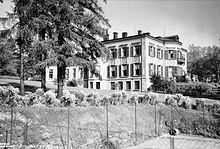Arthur James Herbert (diplomat)
Sir Arthur Herbert GCVO (22 August 1855 – 31 August 1921) was the first British envoy to Norway.
Career
Arthur James Herbert was educated at Christ Church, Oxford and joined the Diplomatic Service in 1879. He served at Petrograd, Washington, D.C., Buenos Aires, Tehran, Brussels, Bern and Stockholm. He was Consul-General at Budapest in 1902 and chargé d'affaires at Darmstadt (Hesse) and Karlsruhe (Baden) 1903–05. He received official allowances for knowledge of Russian and Persian and spoke five other languages fluently.[1]
After the dissolution of the union between Norway and Sweden in 1905, Herbert was appointed the first British envoy to the newly independent Norway, with the then-customary title of Envoy Extraordinary and Minister Plenipotentiary.[2] He was the first foreign envoy to arrive in Christiania (now Oslo) after the recognition of Norway as an independent state by foreign powers.[1]

Shortly afterwards he bought the Villa Frognæs, built in 1859 for the banker Thomas Heftye and recognized as one of the finest private residences in the city, to be the British Legation. The Foreign Office had strongly recommended a rental property, but Herbert argued that with the new Norwegian king, Haakon VII, married to a British princess, it was imperative for Britain to establish a first-class legation there, and the British Treasury approved the purchase early in 1906.[3] The Villa Frognæs remains the official residence of the British Ambassador, but new offices have been built behind the house, facing Thomas Heftyes gate, to house the embassy.
Herbert was appointed envoy to Mexico in 1911 but did not proceed and instead retired from the diplomatic service.
Honours
Herbert was appointed CVO in 1905,[4] knighted KCVO on his appointment to Norway[5] and raised to GCVO in 1908.
References
- HERBERT, Sir Arthur (James), Who Was Who, A & C Black, 1920–2007; online edn, Oxford University Press, Dec 2007
- Death Of Sir Arthur Herbert: First British Minister To Norway, The Times, London, 1 September 1921, page 13
- ↑ 1.0 1.1 The Times, 1 September 1921, page 13
- ↑ The London Gazette, 1 December 1905
- ↑ Mark Bertram, Room for Diplomacy: Britain's Diplomatic Buildings Overseas 1800-2000, Spire Books, 2011
- ↑ The London Gazette, 3 February 1905
- ↑ The London Gazette, 21 November 1905
External links
- Archival material relating to Herbert, Sir Arthur James (1855-1921) Knight Diplomat listed at the UK National Archives
| Diplomatic posts | ||
|---|---|---|
| New title | Envoy Extraordinary and Minister Plenipotentiary to His Majesty the King of Norway 1905–1911 |
Succeeded by Sir Mansfeldt Findlay |